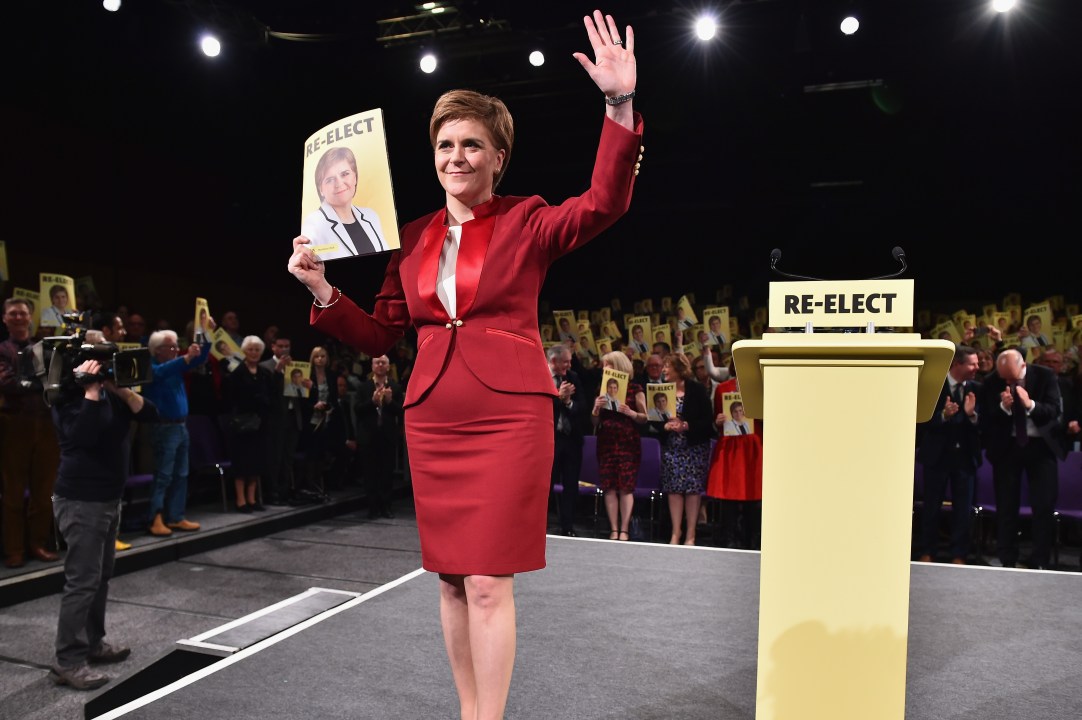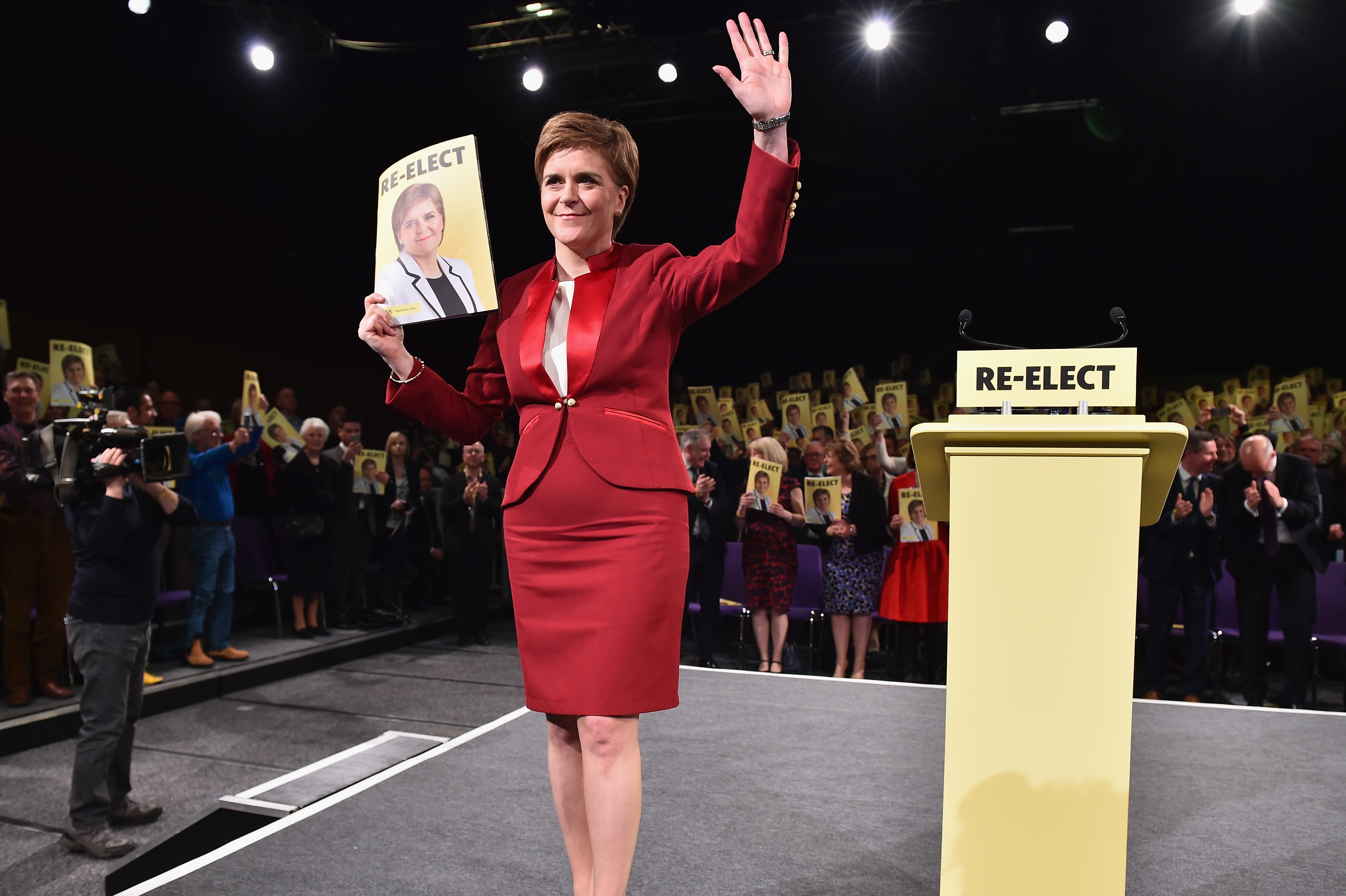The SNP launched their manifesto for the forthcoming election to the Scottish parliament in Edinburgh today. 1,400 party members gathered for morning worship at the Edinburgh International conference Centre. Members of the media were forced to wear security bracelets emblazoned with the slogan “I’m with Nicola” which, given the contempt with which many nationalists view the press, was a nice touch.
Your correspondent was not present, partly because he had forgotten the manifesto launch was taking place today but chiefly because none of it mattered in the slightest. The SNP don’t need a manifesto to win this election. They are the masters now and there’s nothing they or their opponents can do about it.
Still, the SNP really is unlike other parties. Despite its swollen size – more than a hundred thousand members – it still has a family feel. The members are part of something bigger than themselves and, more to the point, feel a greater degree of ownership than is the case in other parties.
And why wouldn’t they? They have a cause, after all, and a cause is a fiercely valuable thing. Every member of the SNP believes in independence which means they can afford to disagree on other matters without that being a problem or causing the party leadership any significant difficulty. There is unity on what matters and that is all that matters. As Nicola Sturgeon said this morning, “Not a day that goes by that I am not asked if there will be a second referendum in the next parliament”.
Five years ago a vote for the SNP was a vote for a referendum on independence. Not that the leadership really expected to be in a position to deliver on that promise, of course. The SNP’s majority took the party by surprise. Suddenly a referendum had to happen.
It’s different now.
Next month, a vote for the SNP is not necessarily a vote for another referendum. At least not imminently. Unless matters change. Brexit remains a possible ‘material change in circumstance’ but even Brexit alone would not trigger a referendum. The opinion polls must move first (and Brexit could nudge those in the SNP’s direction). As Sturgeon put it, setting a date for a referendum before a majority of Scots have indicated they will support independence gets matters “the wrong way round”. A second referendum must confirm a new reality; it must be a fait accompli. You can afford to lose once, but not twice.
At this point, statute demands I remind you of Jeremy Corbyn’s importance. If, as seems modestly possible, he leads Labour to disaster in 2020 and suffers the kind of shattering defeat from which it takes more than one election to recover, there will loom the prospect of 20 years of Tory rule (2010-2030). I can imagine that concentrating minds in Scotland, nudging some 2014 Unionists towards independence by, say, 2023. If Nicola Sturgeon asks for patience it is because she can afford to play a longer-game.
Nothing is inevitable but as matters stand there is no good reason to suppose the SNP’s supremacy will not endure for many years yet. Not that Sturgeon is taking any chances: a feature of this campaign has been the SNP’s tribal desire to crush its erstwhile allies in the independence movement. Even though the SNP will win almost every constituency, SNP voters should be wary of loaning their regional votes to the Greens or the newly-cobbled-together collection of socialists who make up RISE. #BothVotesSNP even if, as it may, this allows Labour, the Tories and even, wonder of wonders, the Lib Dems to squeeze out a few extra seats at the expense of the Greens and Trots.
As for policy, well, what does policy really matter? The SNP’s heart is in the right place. And so are its feet. It alone will stand up for Scotland.
So contradictions abound. The party will “do everything in our power to stop austerity in its tracks” though it will not increase taxes, preferring instead to make 370,000 taxpayers to forgo the tax-cuts promised by George Osborne over the course of this parliament. (By 2020, a Scottish headteacher or police inspector earning around £50,000 will pay £800 or so more in income tax than their counterparts south of the border.)
Elsewhere, the SNP balances a commitment to reduce carbon emissions by 50% with an airline-pleasing 50% cut in Air Passenger Duty, the better to encourage tourism. (I wager this will be champion news for the airlines but, on most routes, make no difference to fares: prices will remain as they are and the airlines will cheerfully pocket the extra cash.)
An SNP election leaflet, delivered to thousands of households, asks Who benefits most from our policies? before giving the implausible-but-reassuring answer We all do. There is something totalising about this insistence everyone can have prizes, that there can be winners without losers, but it is both a neat trick and an essential one for a truly national, embodiment-of-the-people, party to play.
Even so, occasionally a chink of truth penetrates the SNP’s armour. Hence by far the most revealing, and perhaps most significant, moment of Sturgeon’s manifesto launch came when she swore to “restore Scotland’s education system to pride of place in the world”. A noble ambition certainly, but also an admission of failure. The nationalists have been in power for nine years and if some of the problems in Scottish education predate their watch none of them have been usefully addressed in those nine years.
It is, I suppose, to Nicola Sturgeon’s credit that she recognises this and equally to her credit that this is “a commitment I ask to be judged upon” but, at the risk of appearing cynical, I suspect she can simultaneously be sincere and relaxed about this. Sincere in her appreciation that education in Scotland is fine for many but desperate for many others but also relaxed in knowing that she can ask to be judged on her record because she knows she will not be.
After all, if you believe in independence why would you forsake the party that stands for independence simply because it missed targets* on closing the attainment gap between the poorest and wealthiest pupils? To do so would be illogical. The SNP can be forgiven their failures (not least because, you know, independence would answer those failures).
Politics is a matter of identity and self-affirmation. The party you choose, in Scotland these days, is based first and foremost on your view of the national question. Everything else is secondary (which is also why although 80% or so of the SNP manifesto is largely indistinguishable from Labour’s offering yet the Nats will win more than twice as many votes as Labour next month).
It’s Nicola’s party and it’s Nicola’s country too. Because Scotland is not the place it was and the cause, and the dream, still lives. And there’s nothing any of the opposition parties can do to change anything about that.
When the SNP wins, you see, Scotland wins.
*Those targets, meanwhile, can be gamed to give the impression of progress without necessarily improving the actual quality of education.








Comments